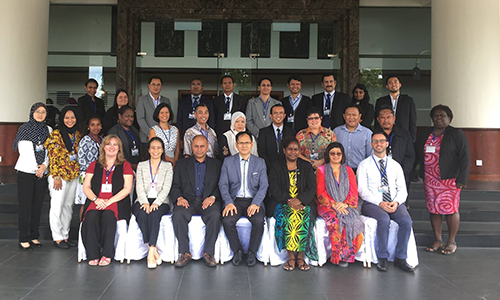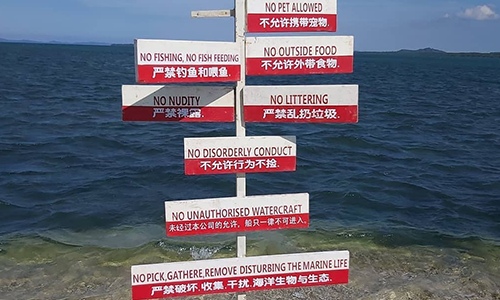The Coral Triangle Initiative on Coral Reefs, Fisheries, and Food Security (CTI-CFF), also shortly known as the Coral Triangle Initiative (CTI), is a multilateral partnership of six countries (Indonesia, Malaysia, Philippines, Papua New Guinea, Solomon Islands, Timor-Leste) working together to sustain extraordinary marine and coastal resources by addressing crucial issues such as food security, climate change, and marine biodiversity.
Goals of Regional Plan of Action
● Priority seascapes designated and effectively managed
● Ecosystem Approach to Management of Fisheries (EAFM) and other marine resources fully
● Marine Protected Areas (MPAs) established and effectively managed
● Climate change adaptation measures achieved
● Threatened species status improving
Regional Secretariat
The Coral Triangle Initiative on Coral Reefs, Fisheries and Food Security (CTI-CFF) Regional Secretariat was created during the First CTI-CFF Senior Officials Meeting in Bali in December 2007.
It is mandated to promote regional cooperation, sharing of lessons, and facilitate learning across the six Coral Triangle countries – Indonesia, Malaysia, Papua New Guinea Philippines, Solomon Islands and Timor-Leste. The Regional Secretariat also coordinate and monitors the progress in achieving the CTI-CFF Regional Plan of Action goals. Its main activities cover the following areas: organizational development, outreach and communication, regional coordination and mechanisms, technical and thematic working groups, development of key regional reports, and capacity development. It also serves as the main liaison and for all CTI-CFF official functions such as the bi-annual CTI-CFF Senior Officials Meetings and the annual CTI-CFF Ministerial Meetings. It is based at CTI-CFF Regional Secretariat Headquarter in Manado, North Sulawesi, Indonesia.
Geographic scope for implementation of the Plan of Action
The CTI-CFF Plan of Action may be implemented within waters under national jurisdiction of each of the Coral Triangle governments, in accordance with their rights and obligations pursuant to international laws and the prevailing laws, rules and regulations of each country. The scope of application of the CTI is without prejudice to the sovereign rights of the parties over marine resources within national jurisdiction, or the position of the parties on delimitation of maritime boundaries between States with opposite or adjacent coasts. The geographic scope of implementation of the CTI is not intended in any way to redraw the scientific boundaries of the Coral Triangle, which would continue to be defined by coral and coral reef fish diversity.






